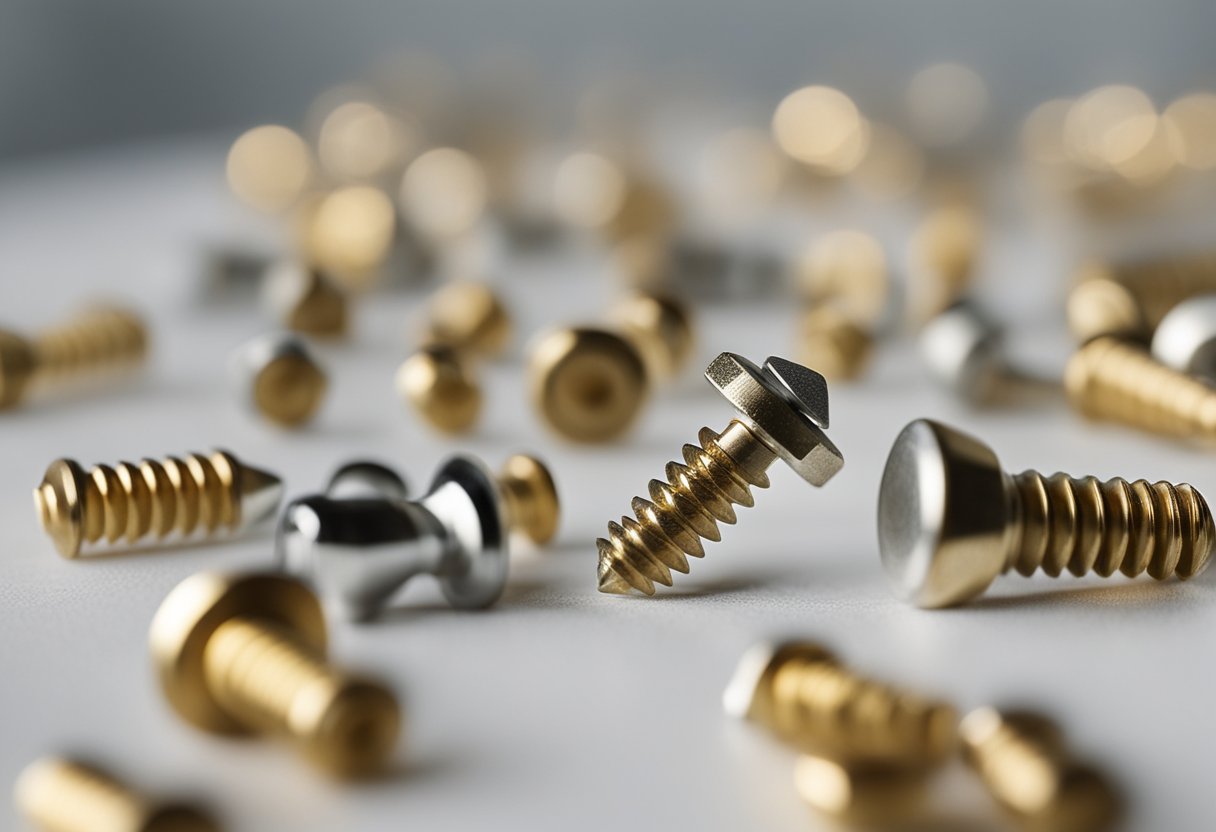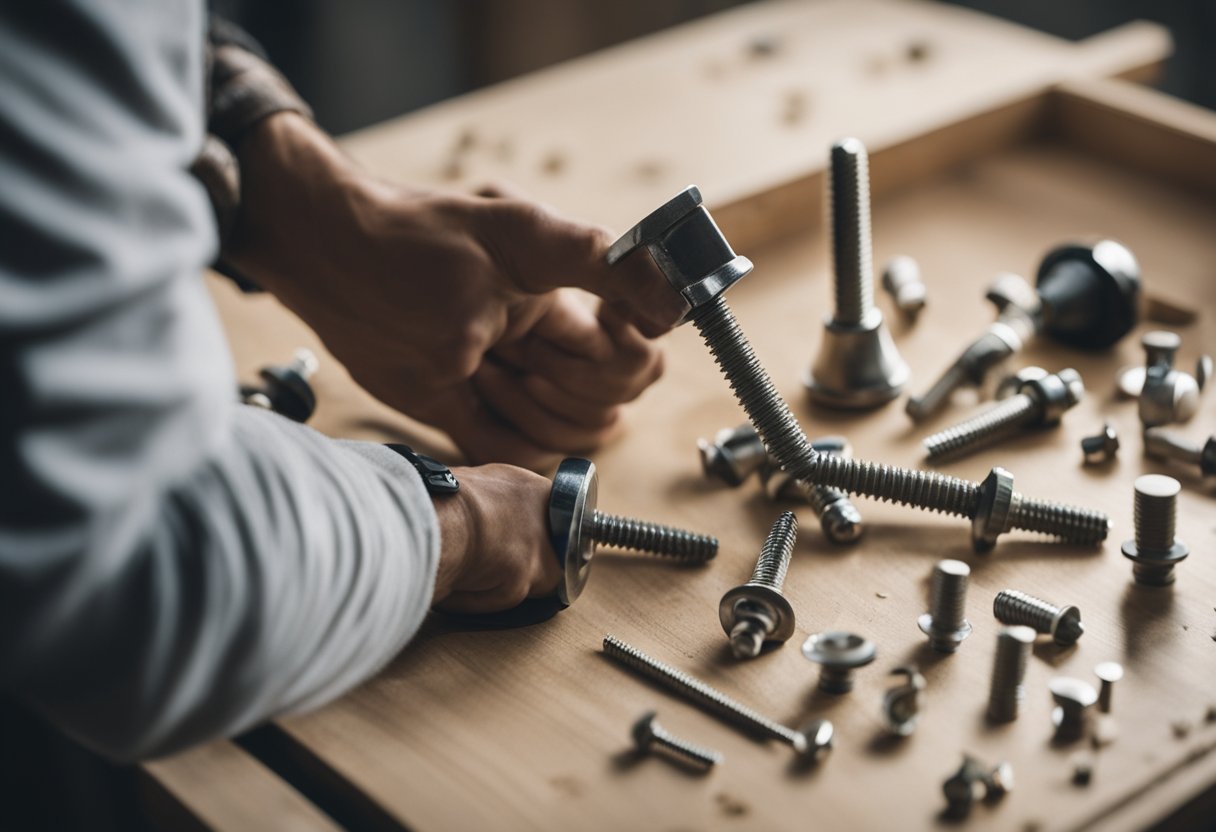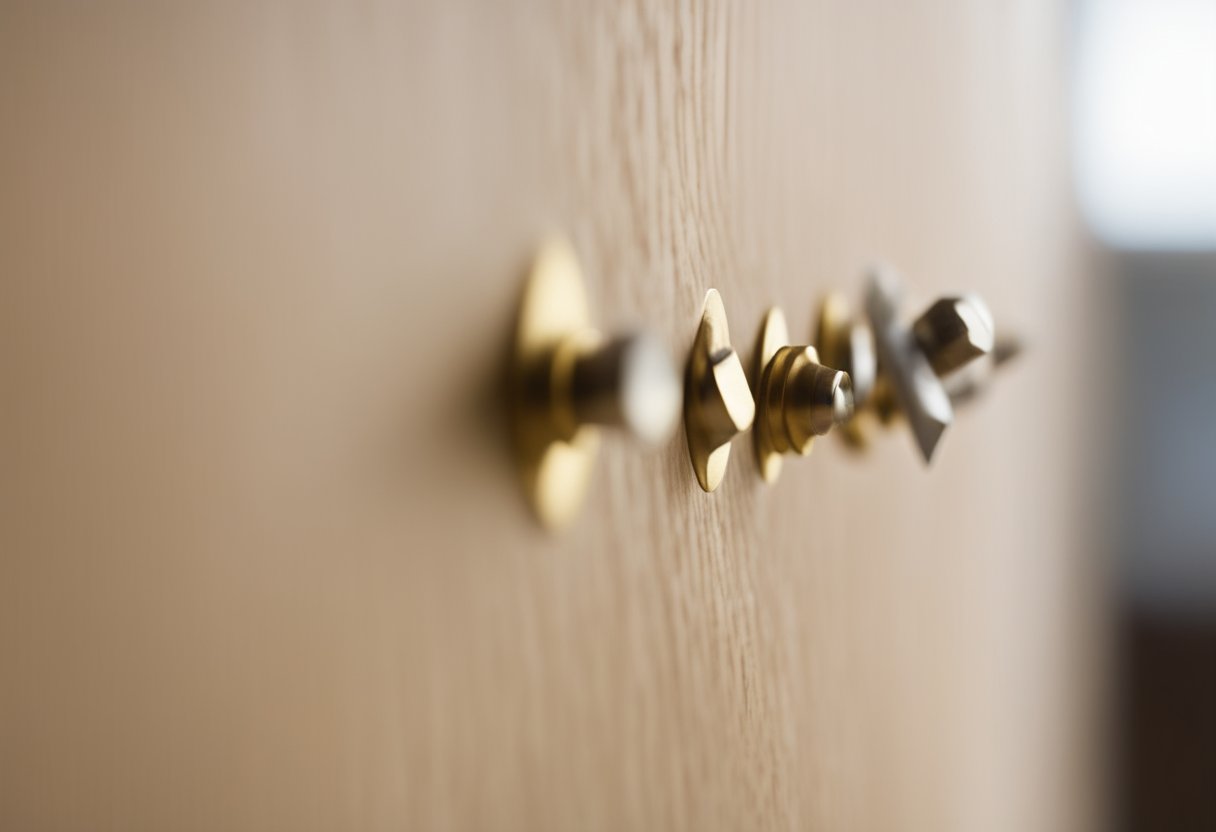As a DIY enthusiast, you may be wondering if you can use wood screws for drywall. The answer is not a simple yes or no. While there are some cases where wood screws can be used for drywall, it’s essential to understand the differences between the two types of screws and their appropriate applications.
Drywall screws are specifically designed for attaching drywall to metal or wood, with bugle heads and sharper points for easy installation. On the other hand, wood screws have coarser threads that can damage the delicate paper surface of drywall. Using the wrong type of screw can lead to weak joints and even cause the drywall to fall off.
In this article, I will provide you with a comprehensive guide to help you understand the differences between wood screws and drywall screws, their features, and appropriate use in different materials. We will also discuss considerations for DIY projects, cost, and availability of screws. By the end of this article, you will have a clear understanding of whether you can use wood screws for drywall and when it’s appropriate to do so.
Key Takeaways
- Drywall screws are specifically designed for attaching drywall to metal or wood, while wood screws have coarser threads that can damage the delicate paper surface of drywall.
- Using the wrong type of screw can lead to weak joints and even cause the drywall to fall off.
- It’s essential to understand the differences between wood screws and drywall screws, their features, and appropriate use in different materials before deciding whether to use wood screws for drywall.
Understanding Drywall and Wood Screws
https://www.youtube.com/watch?v=eBnQdYczeVQ&embed=true
As a DIY enthusiast, I often get questions from friends and family about the best screws to use for hanging drywall. While there are different types of screws available, using the right one is crucial for ensuring a secure and long-lasting installation. In this section, I will discuss the properties of drywall and wood screws, and which screws are suitable for drywall installation.
Drywall
Drywall is a construction material made of gypsum plaster and paper. It is commonly used for interior walls and ceilings because of its affordability and ease of installation. Drywall sheets come in different sizes, thicknesses, and types, such as regular, moisture-resistant, and fire-resistant. When hanging drywall, it is important to use screws that can penetrate the drywall without damaging it.
Wood Screws
Wood screws are screws designed for use in wood materials. They have a sharp point and a threaded body that allows them to grip the wood and create a secure joint. Wood screws come in different materials, such as steel, brass, stainless steel, and hardened steel. They also come in different finishes, such as black phosphate, zinc-plated, and galvanized.
Materials
When it comes to drywall installation, it is important to choose the right type of screw. Using the wrong screw can cause the drywall to crack or break, leading to an unstable installation. For hanging drywall, it is recommended to use drywall screws, which are specifically designed for this purpose. Drywall screws have a coarse thread that grips the drywall and a bugle head that sits flush with the surface of the drywall.
Steel
Steel screws are the most common type of wood screws. They are strong and durable, making them suitable for most woodworking projects. However, steel screws are not recommended for use in outdoor or damp environments because they can rust and corrode.
Brass
Brass screws are corrosion-resistant and have a decorative finish, making them suitable for use in furniture and cabinetry. However, brass screws are not as strong as steel screws and can strip easily.
Stainless Steel
Stainless steel screws are highly corrosion-resistant and are suitable for use in outdoor and damp environments. They are also strong and durable, making them suitable for most woodworking projects. However, stainless steel screws are more expensive than steel screws.
Hardened Steel
Hardened steel screws are heat-treated to make them stronger and more durable than regular steel screws. They are suitable for use in heavy-duty woodworking projects, such as building furniture or framing.
Black Phosphate
Black phosphate screws have a black coating that provides corrosion resistance and a decorative finish. They are suitable for use in furniture and cabinetry but are not as strong as steel screws.
In summary, when hanging drywall, it is important to use screws that are specifically designed for this purpose. Drywall screws have a coarse thread and a bugle head that grips the drywall and sits flush with the surface. Steel screws are the most common type of wood screws, but other materials, such as brass and stainless steel, are also available. Hardened steel screws are suitable for heavy-duty woodworking projects, while black phosphate screws are suitable for furniture and cabinetry.
Types of Screws and Their Features
https://www.youtube.com/watch?v=SG6FJCWYeRU&embed=true
When it comes to hanging drywall, it is important to use the right type of screw. While wood screws may seem like a good option, they are not recommended for use with drywall. Instead, drywall screws should be used.
Drywall screws come in a variety of sizes and types. They are designed to be used specifically with drywall and have features that make them ideal for this purpose. Some of the features of drywall screws include:
- Heads: Drywall screws come in a variety of head types, including bugle head, flat head, and oval head. The most common type of head for drywall screws is the bugle head, which is designed to sit flush with the surface of the drywall and prevent tearing or cracking.
- Points: Drywall screws can have a sharp or self-drilling point. Self-drilling points are ideal for use with thicker drywall or when working with metal studs.
- Threads: Drywall screws can have both fine and coarse threads. Fine threads are ideal for use with thinner drywall, while coarse threads are better for thicker drywall.
- Self-Drilling, Self-Piercing, and Self-Tapping Screws: These types of screws are designed to drill their own holes and tap their own threads, making them ideal for use with drywall.
It is important to choose the right type of drywall screw for your project. Using the wrong type of screw can result in damage to the drywall or an insecure installation.
Comparing Wood Screws and Drywall Screws
https://www.youtube.com/watch?v=xWN9YCAfgxo&embed=true
When it comes to hanging drywall, you may be wondering if you can use wood screws instead of drywall screws. While wood screws may seem like a viable option, it is important to compare the two types of screws to determine which is best for your project.
First, let’s compare the length of the screws. Drywall screws are typically shorter than wood screws, with lengths ranging from 1 inch to 3 inches. Wood screws, on the other hand, can be much longer, with lengths ranging from 1 inch to 12 inches or more. This is because wood screws are designed to go through thicker materials, such as wood studs.
Next, let’s compare the holding power of the screws. Drywall screws have a greater holding power than wood screws when it comes to hanging drywall. This is because drywall screws have a finer thread and a bugle head, which helps to prevent the paper facing of the drywall from tearing. Wood screws, on the other hand, have a coarser thread and a flat head, which can cause the drywall to crack or split.
When it comes to hanging drywall on metal studs, it is important to use the appropriate screws. Drywall screws are designed to work with both wood and metal studs, while wood screws are only designed for use with wood studs.
The screw head is also an important consideration. Drywall screws have a Phillips head, which is designed to prevent overdriving and stripping. Wood screws, on the other hand, can come with a variety of head types, including Phillips, slotted, and square.
Another important factor to consider is the thickness of the drywall. When using wood screws, it is important to make sure that the screw depth is correct. If the screw is too shallow, it can cause nail pops, while if it is too deep, it can create a divot in the drywall.
In conclusion, while wood screws may seem like a viable option for hanging drywall, it is important to consider the differences between wood screws and drywall screws. Drywall screws are specifically designed for hanging drywall and have a greater holding power than wood screws. When hanging drywall on metal studs, it is important to use the appropriate screws.
Appropriate Use of Screws in Different Materials
https://www.youtube.com/watch?v=YU8SlXfWOR4&embed=true
As a DIY enthusiast, I know how important it is to choose the right type of screws for different materials. Using the wrong screw can lead to disastrous results, such as the screw breaking or the material becoming damaged. In this section, I will discuss the appropriate use of screws in different materials.
Woodworking Projects
When it comes to woodworking projects, wood screws are the go-to choice. They are designed to hold wood together securely and can be used to attach two or more pieces of wood. However, it is important to note that the size of the screw should match the thickness of the wood. If the screw is too short, it won’t hold the wood together properly, and if it’s too long, it can damage the wood.
Drywall
When it comes to hanging drywall, it is important to use the right type of screw. Drywall screws are specifically designed for attaching drywall to metal or wood, with bugle heads and sharper points for easier installation. They are different from wood screws, which have coarser threads that can damage the delicate paper surface of drywall. If you’re wondering if you can use wood screws in drywall, the answer is no. Handy Workshop explains that while you can use wood screws, you need to pick the right type.
Concrete, Brick, and Steel Framing
When it comes to attaching materials to concrete, brick, or steel framing, anchors are the way to go. Anchors provide a secure grip in these hard materials and prevent the screws from slipping out. Anchors come in different types, such as wedge anchors, sleeve anchors, and toggle bolts, and it’s important to choose the right one for the job.
Decking Screws
When it comes to building a deck, decking screws are the best option. These screws are designed to resist corrosion and hold up against the elements. They also have a special coating that makes them less likely to split the wood. It’s important to choose the right size and length of screw for the job to ensure a secure hold.
Pilot Holes
No matter what material you’re working with, it’s always a good idea to use a pilot hole. A pilot hole is a small hole drilled into the material before the screw is inserted. It helps to prevent the material from splitting and makes it easier to insert the screw. The size of the pilot hole should match the size of the screw, and it’s important to use a drill bit that is slightly smaller than the screw to ensure a tight fit.
In summary, choosing the right screw for the job is essential for a successful DIY project. Whether you’re working with wood, drywall, concrete, brick, steel framing, or decking, there is a screw that is designed to do the job. By using the appropriate screw and taking the time to make pilot holes, you can ensure a secure and long-lasting hold.
Considerations for DIY Projects
As someone who enjoys DIY projects, I understand the appeal of using materials that are readily available, such as wood screws, for various tasks. However, when it comes to drywall installation, there are a few things to consider before using wood screws.
First, it’s important to note that drywall screws are specifically designed for holding up the weight of drywall sheets, whereas wood screws are meant for securing wood materials together. While it is possible to use wood screws for drywall, it’s not recommended as they may not provide the necessary support and could cause damage to the drywall over time.
If you do decide to use wood screws for your drywall project, it’s important to choose the right size and type of screw. According to Handy Workshop, the recommended size for wood screws in drywall is #6 or #8. It’s also important to use a screw gun to ensure that the screws are driven in straight and at the correct depth.
Before screwing the wood screws into the drywall, it’s recommended to pre-drill a hole to prevent the drywall from cracking. Additionally, it’s important to space the screws appropriately to ensure that the drywall is properly supported. According to Remodel or Move, the recommended field interval for wood screws in drywall is 16 inches.
After the screws have been installed, it’s important to cover them with taping compound to ensure a smooth finish. It’s recommended to apply at least two coats of taping compound, allowing each coat to dry completely before applying the next.
Overall, while it is possible to use wood screws for drywall installation, it’s important to consider the size and complexity of the project, as well as its load-bearing capacity. It’s also important to choose the right size and type of screw, use a screw gun, pre-drill the holes, space the screws appropriately, and cover the screws with taping compound for a smooth finish.
Cost and Availability of Screws
When it comes to cost and availability, wood screws are generally cheaper and easier to find than drywall screws. This is because wood screws are more commonly used in woodworking projects and are available in a wide range of sizes and styles.
Zinc-coated screws are the most common type of wood screw and are widely available at hardware stores and online retailers. These screws are affordable and provide good corrosion resistance. However, if you are looking for a more durable option, you may want to consider screws with additional coatings or finishes.
Bronze construction screws are a good option for outdoor projects or in areas with high humidity, as they are highly resistant to rust and corrosion. However, they are more expensive than zinc-coated screws and may be harder to find at local hardware stores.
Drywall nails are another option for hanging drywall, but they are less popular than drywall screws. They are typically cheaper than screws, but they can be more difficult to install and may not provide as strong of a hold.
Fine-thread screws are designed for use with metal studs, but they can also be used with wood framing. These screws have a higher thread count than standard wood screws, which allows them to grip the metal or wood more securely. However, they may be more prone to stripping or breaking than other types of screws.
Self-drilling drywall screws are a popular option for hanging drywall because they eliminate the need for pre-drilling. These screws have a sharp point that allows them to drill through the drywall and into the wood framing without splitting the wood. They are available in a range of sizes and styles and are generally affordable and easy to find.
Conclusion
https://www.youtube.com/watch?v=I3mBvRs5Rmk&embed=true
In conclusion, using wood screws for drywall can be a viable option if you choose the right type of screw and follow the appropriate installation guidelines. It is important to note that using the wrong screw for the job can lead to a project that falls apart in mere minutes.
When choosing a wood screw for drywall, it is important to consider factors such as length, thread type, and gauge. As discussed earlier, wood screws with coarse threads and sharp points are ideal for drywall installation. Additionally, using screws that are specifically designed for drywall can ensure a secure and long-lasting installation.
It is also important to note that using wood screws for drywall is not recommended for outdoor use. Drywall screws are not typically hardened or treated for outdoor use, so they are prone to rust, corrode, and break more quickly than outdoor-grade decking screws.
Overall, if you choose the right wood screws and follow the proper installation guidelines, you can use them for drywall installation. However, it is important to exercise caution and make sure you are using the appropriate screws for the job.
Frequently Asked Questions
Can I use wood screws for hanging drywall?
Yes, wood screws can be used for hanging drywall, but it is not recommended. Drywall screws are specifically designed for attaching drywall to metal or wood, with bugle heads and sharper points for easier installation. Wood screws have coarser threads that can damage the delicate paper surface of drywall. It is important to note that using wood screws for drywall may not provide the same level of stability as drywall screws, and may result in the drywall becoming loose or falling off the wall.
What are the best screws for drywall?
Drywall screws are the best screws for hanging drywall. They are specifically designed for attaching drywall to metal or wood, with bugle heads and sharper points for easier installation. Drywall screws are available in various lengths and thicknesses, and can be used for both walls and ceilings.
What size screws should I use for 5/8 drywall on a ceiling?
For 5/8 drywall on a ceiling, it is recommended to use 1 5/8 inch drywall screws. These screws are long enough to penetrate the drywall and attach it securely to the ceiling joists.
What is the difference between drywall screws and wood screws?
Drywall screws are specifically designed for attaching drywall to metal or wood, with bugle heads and sharper points for easier installation. They have a coarse thread that is designed to securely grip the drywall. Wood screws, on the other hand, have a coarser thread that is designed for use in wood. They may damage the delicate paper surface of drywall and are not recommended for use in hanging drywall.
Can other screws be used for drywall?
Other screws, such as deck screws, should not be used for drywall. Deck screws are designed for use in outdoor decking and are not suitable for use in drywall. It is important to use the correct screws for the job to ensure a secure installation.
Can deck screws be used on drywall?
Deck screws should not be used on drywall. They are designed for use in outdoor decking and are not suitable for use in drywall. It is important to use the correct screws for the job to ensure a secure installation.

Hi, I’m Sal Muller of Tooltrip.com. My DIY experience led me to understand essential power tools for home projects. Tooltrip.com guides enthusiasts and professionals in choosing right tools for any job. I provide concise top tool reviews for easier, efficient DIY.





